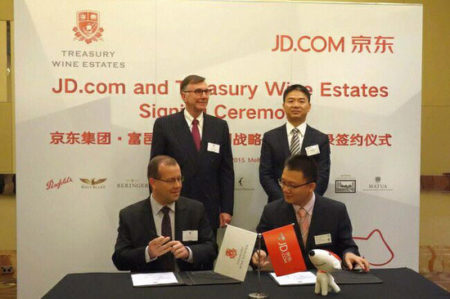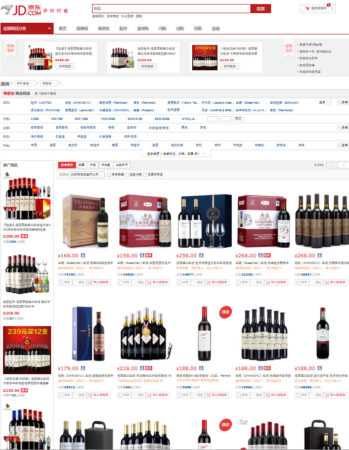文:陆江 | 葡萄酒在线
(本文已发表于Decanter中文版-醇鉴中国,转载请标明出处和署名)
随着社会和经济的发展,中国消费者越来越关注食品安全问题。然而,绝大部分的消费者对葡萄酒不甚了解,无法判断真假和品质高低,所以现在很多消费者在购买葡萄酒时会有或多或少的疑虑。
为此我们采访了中国最大的电商平台之一京东的葡萄酒业务负责人赵大彬,了解京东在选择货源、防止假冒伪劣产品流入等方面采用的策略。

自营品牌:选择口碑好的供货商
对于京东自行经营的葡萄酒品牌,要分两类看待,赵大彬表示。其中一类是京东作为中间环节(采购商),面对国外的酒庄酒商、国内对接的代理商。为保障货源的可靠性“我们会选择行业内口碑比较好的供货商。”
另一类则是京东协助大品牌的经销流通,“大品牌一般是掌握在比较大的集团或是公司下面,他们也有自己的监控体系,不会存在假冒伪劣这个问题。”在与代理商合作的同时,“一般也会拉上酒庄(代理商的供货商)”,以确保货源的可靠性,赵大彬表示。
“我们选的任何酒,我们内部都有品尝,这个一定程度上可以鉴别出来。对京东来讲,口碑就是靠进口行货,这个是我们一贯所坚持的。”
入驻商家:严格条件下的合作
相比自营品牌,京东对于入驻商家的管理“相对轻松一点”,赵大彬介绍道。
相对的,京东与合作商签署的合同里“有比较严格的条件”,商家还需向京东缴纳质保金。如果进驻商家销售假冒商品,需向京东支付人民币“100 万元或该店铺全部累计销售额10倍的金额(二者以高者为准)”作为违约金。
作为监督机制,“我们会有专门的质控部门,他们会定期抽取商家产品去检查,另外我们也会有第三方的机构定期去库房抽检,因为发货的产品有一部分库存会在京东。”
此外,京东还成立了用户体验部,定期购买产品进行检验。赵大彬介绍说,京东总裁刘强东也参与其中,“他对葡萄酒感兴趣,所以也很重视这部分。”
品牌的选择
对于自营品牌的选择,京东首先希望“尽量做到全覆盖”著名的产区,对于每个产区做“前三或前五名的品牌”,此外酒款需要具有较高性价比,赵大彬介绍。
“对于国内供货商部分产品,我们也会和他们进行合作,当然没有像直采那么严格,也会有选择。由于我们有非常大的(需求)量,所以和供货商去谈,需要(对方)有一个非常有优势的价格。”
如果需要某个产区的葡萄酒,赵大彬和他的团队可能首先通过葡萄酒圈的人脉关系,或各产区行业协会的帮助进行推荐和介绍。此外,他们还会参加Vinexpo、ProWein等葡萄酒展会,实地选酒。对于一些主动联系的酒商,京东会先要求酒样,进行一个简单的盲品,从中选几个出来,然后商谈价格和合作方式。
“我们现在在售的单品数量,有1300多个。主流的产酒国都有了,偏门的产区基本上没有。”赵大彬介绍道。
仓储与物流
对于葡萄酒电商,仓储和物流往往是一大瓶颈。前几年中国葡萄酒垂直电商拿到投资,很大一部分都用于建设仓储物流体系。
而作为成熟的大规模电商,京东拥有自己的快递。运送葡萄酒时则采用“吸入式包装”,“和手机等贵重电子产品的包装类似”,赵大彬介绍说。
就仓储而言,京东利用专门的食品运营仓储存一般葡萄酒,有一部分常温,一部分恒温恒湿。“虽然说我们的恒温恒湿和专业的葡萄酒窖还是有一定的差距,结合我们目前的业务状态,目前入库,都是一些流通产品。动销速度比较快,一个月已经转一圈了。”赵大彬认为,这样的动销速度下,对葡萄酒的品质影响不大。
而对于高档葡萄酒(fine wines),京东会采用更专业的温控技术保质。
“以前在我们刚开始做业务的时候,一些顾客会发现酒因为储存不当发生鼓塞,有瑕疵,但现在这种几率非常低了。”
*京东葡萄酒消费小贴士*
提问:现在时不时看到京东上有些满减的优惠,或是优惠券,这些一般是些什么情况的产品?
赵大彬:这些主要是有些酒的品类在平台供销情况不太理想,所以就低价促销。再加上我们的采购体量大,所以议价能力也不错,于是销售价格是很有竞争力。一般优惠券是京东补贴的,合作伙伴也会有不同形式的支持,所以有可能买到低于市场价格的产品。
更多信息欢迎查阅上一期:京东:中国葡萄酒电商的发展现状(规模与模式篇)
*点击http://www.DecanterChina.com查看原文,查询身边的优质葡萄酒,读遍名家专栏,学练WSET知识点,阅览海内外葡萄酒信息。DecanterChina.com是1975年创刊的国际葡萄酒权威媒体Decanter为日益成长的中国葡萄酒爱好者量身打造的中英文双语网


